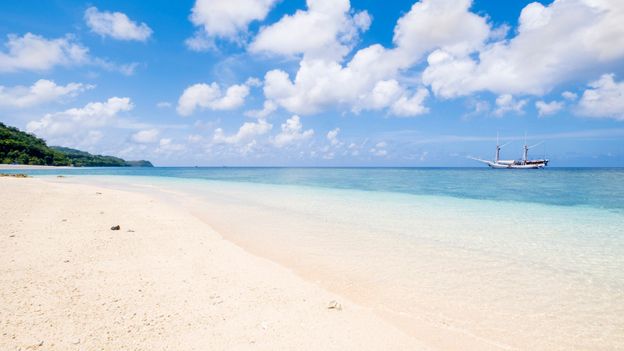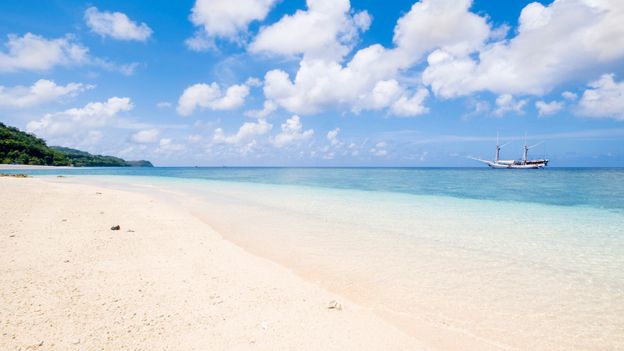

The Indonesian island of Sulawesi sprawls like a drunken starfish in the western Pacific Ocean, its four emerald limbs reaching into the Celebes, Molucca and Flores seas. On its south-western tip sits the smog-choked port city of Makassar, long an important trading post and Indonesia’s eastern gateway to the world.
In the grey dawn I stood on the waterfront and watched the curved prows of prahu sailing ships proceed elegantly into the chaos of Paotere Harbour, here to unload their bounty of sea cucumbers, cuttlefish and other strange creatures of the deep. These vessels belong to the Bugis people, a seafaring society remarkable for its recognition of five separate genders.
Despite only numbering around six million in a country of 270 million, the Bugis are highly influential
“The Bugis have words for five genders,” explained Sharyn Graham Davies, an anthropologist at Monash University in Melbourne, Australia, “that map onto five ways of being in the world.”
The Bugis are the largest ethnic group in South Sulawesi. Their heartland is in Makassar and the rice-growing countryside north of the city, but their prowess as seafarers and traders established their influence across Indonesia and the Malay Archipelago (and struck fear into the hearts of European colonisers, who regarded them as ruthless pirates). Despite only numbering around six million in a country of 270 million, the Bugis are highly influential: prominent examples include Jusuf Kalla, two-time vice president of Indonesia; and Najib Razak, former prime minister of Malaysia.
“The Bugis are among the strongest ethnic groups in the archipelago, politically, economically and culturally,” said Sudirman Nasir, a Bugis who works in public health in South Sulawesi.
Davies explained that in Bugis society, makkunrai and oroani correspond to Western concepts of cis female and cis male. Calalai are born with female bodies but take on traditionally male gender roles; they may wear shirts and trousers, smoke cigarettes, wear their hair short and work manual jobs. Calabai are born with male bodies but take on female gender roles, wearing dresses and makeup and growing their hair long. “Many calabai work in beauty salons,” said Neni, a calabai from the village of Segiri, north of Makassar. “We also help to plan weddings and perform at wedding ceremonies.”
You may also be interested in:
• The third gender of southern Mexico
• The tiny island traded for Manhattan
• The islands where women make the rules
Calabai do not impersonate women, Davies explained, but exhibit their own suite of feminine behaviours that would be frowned upon in makkunrai women, like wearing miniskirts, smoking and acting in a more outwardly sexualised manner. Within Bugis society, calabai and calalai people may be disapproved of in some quarters, but they are widely tolerated, even seen as playing an important role in society, and are generally not attacked or otherwise persecuted by their own community.
The fifth Bugis gender is bissu, which is considered neither male nor female but representative of the totality of the gender spectrum. Bissu, like calabai and calalai, display their identity through dress: they often wear flowers, a traditionally feminine symbol, but carry the keris dagger associated with men. Many bissu are born intersex, but the term has implications beyond biology. While Bugis gender is often described as a spectrum, bissu are deemed to be above this classification: spiritual beings who are not halfway between male and female, but rather embody the power of both at once.
“It is said that on their descent from heaven bissu did not split and become male or female, like most people,” Davies explained, “but remained a sacred unity of both.” As such, they are perceived as intermediaries between worlds and occupy a shaman-like role in Bugis religion.
A serene old lady and a clucking chicken were my travel companions in a battered sky-blue bemo (public minibus) as I left Makassar behind. As we rattled north, jagged shards of limestone karst, tufted with jungle, lurched skyward from the surrounding rice paddies. It was planting season, and we passed a field where a mechanical plough was being pushed along, preceded by a ritualistic parade of bissu, recognisable by their robes of red, gold and green and their headdresses adorned with colourful flowers. We drove on. The evening sun began to glow like coal, and the Bugis farmers, bending to tend the rice fields, cast hunched and lengthening shadows.
As darkness fell, we arrived in the town of Segiri, where I followed a throng of locals into a large wooden house. Five bissu were gathered in the centre of the room around a pile of rice. Fragrant incense smoke swirled in the near-darkness, and the sound of drums and chanting quickened to fever pitch as the bissu danced jerkily into a trance-like state. In unison, they unsheathed their keris daggers and began to stab the wavy blades into their own temples, palms, even their eyelids – seemingly not feeling any pain or barely even drawing a drop of blood. To undergo this ritual, known as ma’giri’, and come through it unharmed is seen as proof that the bissu have been possessed by the gods and are ready to give blessings. This ceremony, like the parade in the rice field, was geared towards ensuring a bountiful harvest; good health and successful pregnancies are among other outcomes hoped for from a bissu blessing.
“Becoming bissu is a call of the soul,” explained Eka, the head bissu in Segiri. “We travel at an early age to study with a senior bissu, and learn our secret language, Basa To Ri Langiq (Language of the Heavens), which only we can understand.”
In addition to granting blessings, Eka officiates at weddings. “The Bugis treat us very well,” Eka said. “They have to, because we oversee all the Bugis customs.”
Although their religious rituals and conception of gender are infused with pre-Islamic ideas, most Bugis are Muslims, many devoutly so. “There were complex interactions between Bugis values and Islamic teaching,” explained Nasir. “This led to forms of Islamic-Bugis syncretism.”
Since the mid-20th Century, wider Indonesian society has become less tolerant of non-binary ideas of gender
For example, as Davies explained, Bugis people often seek out bissu to bless a forthcoming hajj to Mecca. Many calalai and calabai struggle with their sexuality and sense of self, she also noted, believing that their lifestyle (which may include same-sex relations) is sinful according to Islamic belief, but also that they are the way they are because it was prescribed by Allah. For the same reason, they do not have a concept of being born in the wrong body; even though some calabai may undergo cosmetic procedures to make them look more feminine, they will not consider themselves to be women, as Davies discovered in her fieldwork.
Islam began to predominate across Indonesia in the 1400s, but for centuries the local people reconciled their variegated perception of gender with the new faith. “European sailors were writing about their reflections on gender diversity in South Sulawesi since at least the 1500s,” Davies explained. In 1848, the British colonialist James Brooke wrote in his journal: “The strangest custom I have observed is that some men dress like women, and some women like men; not occasionally, but all their lives, devoting themselves to the occupations and pursuits of their adopted sex.” Upon visiting South Sulawesi, Brooke was further surprised by the social equality he observed between women and men, a sentiment shared by his fellow imperialist Thomas Stanford Raffles.
A third gender known as waria (a portmanteau of wanita, meaning woman, and pria, meaning man) has long been acknowledged in societies across Indonesia. Since the mid-20th Century, however, wider Indonesian society has become less tolerant of non-binary ideas of gender, which has resulted in persecution towards calabai and bissu people in particular. Beginning in the 1950s, a wave of violent attacks started against the LGBTQ community.
“When Kahar Muzakkar’s Darul Islam rebellion movement wanted to establish an Islamic state in the 1950s, the bissu were arrested, tortured and forced to repent,” said Nurhayatai Rahman Mattameng, a Bugis philologist. Some bissu had their heads shaved so they could be publicly shamed; some were killed. “During the New Order era under President Suharto (1967-1998), there was an initiative called Operation Repentance,” Mattameng added. “All bissu people were forced to [renounce] To Latang, the ancestral religion of the Bugis, and choose one of the officially recognised religions in Indonesia instead.”
In 2001, Islamic extremists burned down the Makassar headquarters of GAYa Celebes, a gay rights organisation. In 2018, the Jakarta Post reported that transgender women were being rounded up and placed in detention centres in Indonesia’s capital city, as a “deterrent” to people identifying as waria.
“Bissu, calalai and calabai are experiencing a lot of stigma and discrimination, which is sadly increasing alongside the growing assertiveness of political Islam,” said Nasir. “At the societal level, there is a strong tendency towards an increased piety and puritanism, which could be compared to that of born-again Christians in the West. The future for these persecuted people is not very promising.”
Eka agreed that the future looks bleak. “The number of teachers with knowledge of the bissu ways is decreasing. So is people’s interest in living as calabai,” said Eka. “In the future, bissu will be threatened with extinction.”
Not everyone is so pessimistic about the future, however. There is help at hand in the form of Halilintar Lathief, a Bugis activist, artist and anthropologist. Lathief’s organisation, Latar Nusa, is fighting to revitalise bissu and calabai culture by preserving traditional literature and empowering them to harness the economic benefits of their traditional ritual roles by seeking paid work as bridal makeup artists, wedding planners and caterers and medicinal shamans.
“In the early days, the trauma of persecution they had faced meant no-one wanted to become or claim to be bissu,” Lathief said. “They were afraid of being arrested or killed; some were ashamed. Now, after several years, there are many more people who identify as calabai, and more who are proud to be called bissu.”
Our Unique World is a BBC Travel series that celebrates what makes us different and distinctive by exploring offbeat subcultures and obscure communities around the globe.
Join more than three million BBC Travel fans by liking us on Facebook, or follow us on Twitter and Instagram.
If you liked this story, sign up for the weekly bbc.com features newsletter called “The Essential List”. A handpicked selection of stories from BBC Future, Culture, Worklife and Travel, delivered to your inbox every Friday.